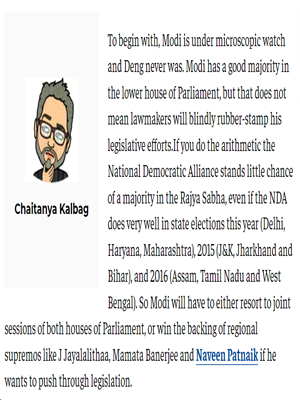PM Narendra Modi is not China’s Deng Xiaoping and he will never be
[The Ecomonic Times]
Published date: 11th Mar 2019
To begin with, Modi is under microscopic watch and Deng never was. Modi has a good majority in the lower house of Parliament, but that does not mean lawmakers will blindly rubber-stamp his legislative efforts. If you do the arithmetic the National Democratic Alliance stands little chance of a majority in the Rajya Sabha, even if the NDA does very well in state elections this year (Delhi, Haryana, Maharashtra), 2015 (J&K, Jharkhand and Bihar), and 2016 (Assam, Tamil Nadu and West Bengal). So Modi will have to either resort to joint sessions of both houses of Parliament, or win the backing of regional supremos like J Jayalalithaa, Mamata Banerjee and Naveen Patnaik if he wants to push through legislation.
Second, Modi is having to deal with a growing elite, a huge and restless middle class, and about 700 million Indians who are barely above the poverty line and are “precariously vulnerable to shocks” as the World Bank puts it.
Second, Modi is having to deal with a growing elite, a huge and restless middle class, and about 700 million Indians who are barely above the poverty line and are “precariously vulnerable to shocks” as the World Bank puts it.
These shocks include rising but invisible unemployment, crushing rises in food prices and transportation costs, and the inevitability of having to pay more for water, electricity and cooking fuel if Modi wants to slay the dragon of subsidies. In contrast Deng had far lower expectations to tackle when he unleashed reforms in China 35 years ago. In the 1990s, just after India launched its own reforms, both countries had roughly equally competent bureaucracies.
China, however, relentlessly built its institutions and better accountability, and the implementation of government plans was therefore that much more efficient – but also ruthless. I remember meeting Xu Kuangdi, the mayor of Shanghai, in 2001. Over the previous six years Xu had spearheaded Shanghai’s transformation into a dazzling, modern city, chiefly through developing the industrial wasteland of Pudong into a landscape of skyscrapers, high-speed trains and bustling bourses. But then Xu must have made a misstep, because a few months later he was “promoted” to a largely academic post in Beijing. At the height of his glory, Xu could raise funds to boost Shanghai’s infrastructure with little interference from Beijing.
Can we picture that sort of free hand in India, where suffocating labour laws and land-acquisition rules look set to severely test Modi’s dream of building a high-speed train network and 100 new cities?
Modi seems to be taking the testtube route. Over the past month his party colleague Vasundhara Raje has taken the plunge into the labour cesspool in Rajasthan after her spectacular assembly election victory with some very bold reforms.
Her government aims to amend three of the most vexatious central labour laws as well as the Apprentices Act to create more jobs for young workers. More grease to Modi’s elbow if Raje succeeds.
Third, unlike China, India is not a command economy. Even if it were, Modi is aclearly out to demolish some old structures. For instance, one week from the Budget he does not have a chief economic adviser and has kept the offices of the Planning Commission (PC) empty. This means next week’s Budget speech may move away from the absurdity of “plan” and “non-plan” expenditure.Four years ago, Prime Minister Manmohan Singh told the PC it needed to move to being a “system reforms commission”. That never happened (in China they now call their planning body the National Development and Reform Commission). With his memories of Gujarat, Modi appears to want to forge a new way to negotiate capital expenditure with state governments and encourage an open and hopefully competitive economic federalism.
That will not be a day too soon.
India ranked 120th in the Heritage Foundation’s 2014 Index of Economic Freedom, sandwiched between Greece and Guyana. It was a tiny step up from last year, but we were 25th out of 41 countries in the Asia-Pacific region.
“Does India need a certain amount of fiscal discipline at this time? Do we need prudence? Or do we need mindless spending and populism?” Arun Jaitley rhetorically asked an audience of chartered accountants on Tuesday.
With 45.6 per cent of this fiscal year’s deficit target already gobbled up in April and May, oil prices headed towards $110 to a barrel, and food inflation spiralling the finance minister must feel like a man trapped below decks in a capsizing ship. Raising the prices of train tickets and gas cylinders is easier than raising taxes; India’s tax-to-GDP ratio is already among the lowest in the world (it was 10.7 per cent in 2012 versus 27.3 per cent in Norway and 21.5 per cent in Sweden). But those Nordic countries became welfare states after they got rich. On the contrary, India already has bloated government expenditure and hugely expensive welfare schemes like the Mahatma Gandhi National Rural Employment Guarantee Act (MNREGA) and the Food Security Act. How are Modi and Jaitley going to cycle back from these hills?
One survey found that more than 70 per cent of rural households had not even heard of MNREGA. You do not need to travel very far out of any big city to meet people who are looking to move up the income scale and not be on the dole. They want hand-ups, not hand-outs.
“I think things will eventually be all right, but it’ll take time to sort all this out,” an international economist I spoke to said. Meanwhile, we should stop seeing Modi with a magic wand and lower the bar.
Forget a revolution – if Modi could just achieve a few big things…






